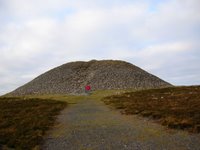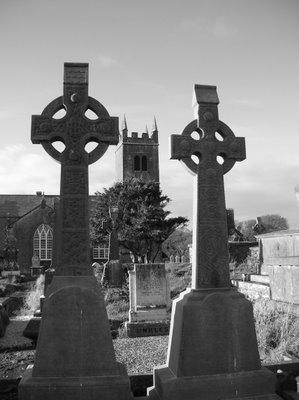
Knocknarea (Queen's Maeve's Grave)

Carrow Keel megalithic tombs

Ruins along the Gleniff horseshoe
Reading: The Bedford Companion to Shakespeare and A Midsummer Night's Dream
Since I leave tomorrow for Ireland, then over to Oxford next week to start my summer studies, it seems a good time to post the following poem. It explores some of the ideas we often talk about here: what is the relationship of myth or false religion to truth; how much essentialy connection with reality do words have; how much spiritual truth can nature show forth; is the worded truth always the best or clearest; how do the past and distance make something romantic.... Well, we haven't always talked about these, but they are undercurrents to our thought. I welcome comments and critique. Please continue to check this blog over the next two months; I plan to post thoughts, pictures, and discussions that arise from my studies and travels.
Crows over Collooney
Crows flock over Collooney—thousands of rooks
in monochrome cacophony—a sight
of cackling specks on shades of gray, a sound
of some forgotten speech. The wind tells tales
and mutters legends under ancient words
whose consonants I do not understand.
Once, a people walked who understood
the language of the sky, the speech of rooks,
the significance of swans. Their insight
exhumed the inner life. They knew the sound
that growing makes; they read the season’s tales.
The world was hieroglyphics for their words.
But we, in learning light, have lost their words.
No longer does the night call us to stand
in solstice circles, drawing wheels for rooks
to follow through a flame-lit sky, excited
by enchanting demon voices sounding
from the sea. And we have lost their tales.
Those hidden people, in ash groves, told tales
in which the wind and ocean waves had words,
had music: every mouth-round calling stood
for what it named. They knew a fly, a rook,
a swan, held human nature. Second-sight,
mythopoetic, saw earth how it sounds.
But we have lost their stories with their sounds.
More has gone than songs of trees and tales
that creatures tell. Now Autumn owns no words
without those priests to speak its song who stood
at zeniths where roots, rocks, ravines, and brooks
met and the world was one: a single sight.
Something else is granted to the sightless.
What’s past is mystery. What stories sound
and resound fainter become fairy tales
tossed on the air, just echoes, mute and wordless
on the overtones of time. A standing
stone, a crumbling cairn, and cries of rooks
around their rookery at dusk seem sights
becoming visions, sounds like ancient tales—
their wordless essence lovelier misunderstood.
- Admonit

4 comments:
Where in Ireland are you going? (I'm from Cork myself).
Co. Sligo. My husband's family is here. It would be beautiful here in the summer now if it would stop raining and warm up above 50 F!
Thanks for commenting. Any thoughts on the poem?
And do you have any more thoughts on avant-garde Christian poetics?
I would especially like to see some examples; some poems or poets you think have wrestled with and mastered this--what? ideology? philosophy? aethetic?
--the concept of modern Christian poetry that uses contemporary thought against itself with mastery and relevancy.
Other readers: click Bob's name and you can read his blog. It's well worth while.
Thanks for the pointing out the link to bob's blog. It was indeed worth reading.
Post a Comment